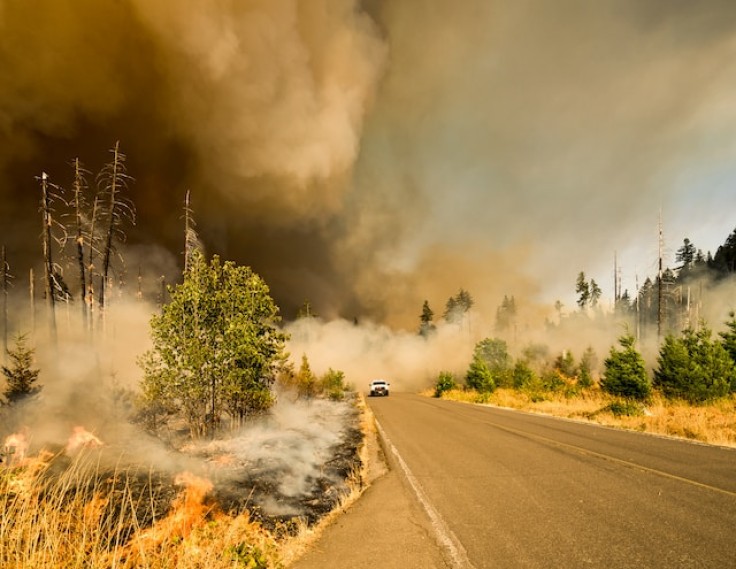
Thousands of tourists and residents were forced to evacuate as a devastating wildfire struck the picturesque Greek island of Rhodes. The fire, which had been burning for nearly a week, escalated when strong winds fanned the flames, posing a serious threat to resorts and coastal villages. Amid the chaos, tour operators Jet2, TUI, and Correndon had to cancel flights to and from the island, according to Rappler.
Witnesses described the situation as apocalyptic, with thousands seeking refuge in schools, shelters, and even on beaches while awaiting evacuation to safer areas. Coastguard vessels and private boats stepped in to help evacuate over 3,000 tourists from beaches, ensuring their safety during the wildfire's relentless progression.
Resilience and Generosity Amidst Disaster: Locals and Tourists Unite in Evacuation Efforts on Rhodes
Residents and visitors alike recounted terrifying experiences of escaping the flames, with some describing it as "the end of the world." The timely intervention of volunteers and emergency services helped prevent further casualties, though one pregnant woman and another person were hospitalized due to the fire's impact.
Rhodes, known for its stunning beaches and historical sites, is a popular destination for tourists, especially during peak season when it can receive up to 150,000 visitors. The wildfire struck several seaside villages, leaving a trail of devastation in its wake. The authorities worked tirelessly to accommodate and provide assistance to the evacuees, setting up makeshift shelters in hotels, stadiums, conference centers, and schools.
The German travel association DRV estimated that around 20,000 German tourists were on the island during the wildfire. However, only a small proportion of them were directly affected by the evacuations. Tour operators like Jet2 and TUI took the necessary measures to ensure the safe return of tourists to their home countries.
In an effort to put out the wildfire, more than 250 firefighters battled the flames with the aid of 18 aircraft. Setting up firebreaks and strategizing to stop the flames from spreading further became crucial tasks to safeguard a dense forest and additional residential areas from the inferno.
The tragic incident highlights the increasing risk of wildfires in Greece and other parts of the world due to climate change. Civil protection warned of a very high risk of wildfires as temperatures soared to a scorching 45 degrees Celsius. The impact of climate change has led to hotter, drier summers, creating a conducive environment for wildfires to thrive.
As climate change persists, wildfires are likely to become more frequent and intense, according to UNEP. The World Meteorological Organization (WMO) has issued warnings about the rising threat of extreme heatwaves, which may last until August. Urgent measures to address climate change are crucial to mitigating the risks posed by devastating wildfires in the future.
The situation on Rhodes also highlighted the importance of coordinated efforts and community spirit during times of crisis. Local businesses and individuals demonstrated immense generosity, offering food, water, and assistance to those in need. Shops refused payment for essential supplies, and small boats prioritized the safety of women and children during the evacuations.
Aftermath of Devastation: Rhodes Reels from Wildfire Impact, Calls for Climate Action Grow
In the midst of the catastrophe, technology played a pivotal role in disseminating information and coordinating rescue efforts. Social media platforms were flooded with updates, helping people stay informed about evacuation procedures, safety measures, and available resources. Tourists at the airport shared footage of crowded terminals, reflecting the urgency of the situation.
Despite the devastating impact of the wildfire, there were also tales of resilience and courage. Volunteers showed unwavering dedication in their fight to extinguish the flames and protect the island's precious landmarks. Tourists and residents alike displayed remarkable strength in navigating the crisis and supporting one another in times of great distress.
As the immediate danger subsides and recovery efforts begin, authorities will assess the extent of the damage to the island's natural resources and infrastructure. The aftermath of the wildfire will serve as a sobering reminder of the urgent need to address climate change and implement measures to mitigate the risks of future wildfires.
Sea levels are rising, extreme weather events are becoming more frequent, and wildfires are spreading at alarming rates. The international community must come together to develop sustainable solutions and reduce greenhouse gas emissions to protect our planet and safeguard vulnerable communities from the devastating consequences of climate change.
In the wake of the tragic events on Rhodes, the solidarity and compassion shown by locals and tourists alike serve as a testament to the resilience of the human spirit. Through collective action and a commitment to climate action, we can work towards a more sustainable future for our planet and generations to come.
Related Article : Father Drops Toddler from Second Floor Window to Escape Apartment Fire